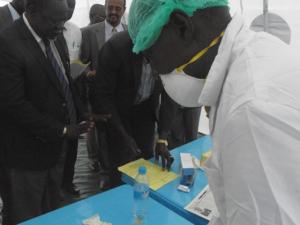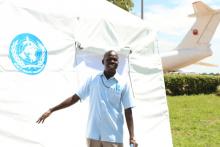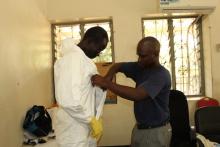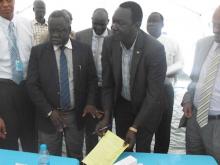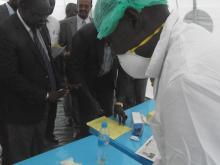WHO Supports Ebola Prevention and Preparedness Efforts in South Sudan
The Ministry of Health in the Republic of South Sudan with technical support from WHO has initiated steps for early detection, investigation and containment of Ebola Viral Disease (EVD) within the country’s borders in the event of cases being reported.
“Given the multiple locations in West Africa and Equateur province in the Democratic Republic of Congo (DRC) where cases of Ebola have been reported and the global travel trends, it is advisable that countries take precautions in order to reduce the risk of an outbreak,” said Dr. Abdinasir Abubakar, Medical Officer for Disease Prevention and Control at WHO South Sudan.
Although no cases have been detected in South Sudan, factors such as the country’s history of previous Ebola outbreaks in Western Equatoria State, global travel and local practices like hunting and eating game meat in some areas call for caution. Further, the detection of 24 Ebola cases including 19 deaths in neighbouring Ikanamongo village, Equateur province in northern DRC in late August raise concern.
Consequently, prevention and preparedness efforts are underway. As an initial step, the Government of the Republic of South Sudan in early August formed a multi-sectoral Task Force comprised of key line ministries and humanitarian partners that immediately drew up a preparedness and response plan. This was followed by training of health personnel on screening for Ebola at major points of entry, the development of Standard Operating Procedures (SOP) and the establishment of screening facilities starting with Juba International Airport (JIA). New arrivals into the country are screened for signs and symptoms such as fever, while factors like their travel history and exposure to Ebola cases in the recent three weeks are checked. Isolation facilities have been established at Juba Teaching Hospital (JTH) and UNMISS level II in case patients are identified. Further, a system of following up and monitoring potential cases for 21 days – which is the incubation period for Ebola – has been set up.
These initiatives are being cascaded to the state level, with focus on entry ports used by road travellers, namely Nimule and Nadapal in Eastern Equatoria State, Ezo in Western Equatoria State and Kaya in Central Equatoria State. Task forces have been formed at state level, while preparedness training and screening services will start during the first week of September 2014.
With support from the WHO, the Ministry of Health has prepositioned stockpiles of personal protective equipment, disinfectants and specimen collection and shipment kits in the high risk states of Western Equatoria, Central Equatoria, Eastern Equatoria, Western Bahr el Ghazal and Northern Bahr el Ghazal.
Surveillance has been strengthened by updating and disseminating the Ebola case definition to all state and county surveillance officers across the country and community sensitization campaigns are in progress through the distribution of information, education and communication (IEC) materials and broadcasting of radio messages among other methods. Infection control guidelines were also distributed to all referral facilities.
By 27 August a total of 5,185 international travellers had been screened at JIA since 13 August when the screening started.
“Although no suspected case of Ebola has been detected since screening activities began, officials are wary of the possibility and remain vigilant,” Dr. Abubakar said.
West Africa is currently facing the worst ever Ebola outbreak, which is affecting multiple countries. The first case was reported in Guinea in March 2014 while cases have been reported in Sierra, Liberia and Nigeria in subsequent months. As of 28 August a total of 3,069 probable and confirmed cases with 1,552 deaths had been reported by the respective Ministries of Health of Guinea, Liberia, Nigeria and Sierra Leone in the current outbreak. The overall case fatality rate is 52%, ranging from 42% in Sierra Leone to 66% in Guinea. A separate outbreak of Ebola, which is not related to the outbreak in West Africa, was laboratory-confirmed on 26 August by the DRC.
- Ebola Preparedness Training
- Ebola Preparedness Training
- Minister and Under Sec
- Minister



